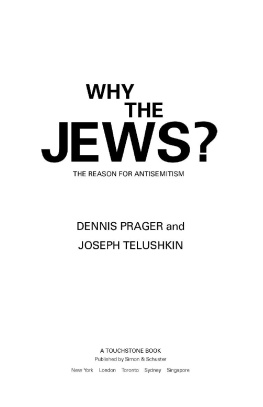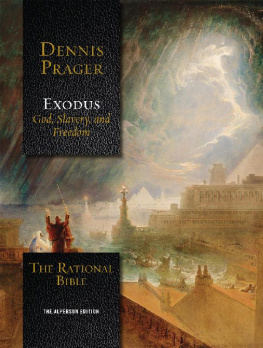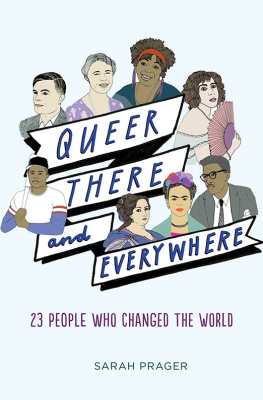DENNIS
PRAGER
Think a Second Time

To Jessica DeBoer,
Danny Warburton (Baby Richard),
and the DeBoer and Warburton families
One day, because of you, society will understand that children are not property and that love is infinitely more important than blood.
CONTENTS
I have written Think a Second Time because most people dont think a second time. Most of us form opinions about lifes great issues at a young age and retain them forever. The reasons are not hard to discern: It isnt comfortable to think through every issue; serious thought is as strenuous as serious exercise, and as we age, most of us become preoccupied with other matters. Family and livelihood problems alone can take up all of ones attention, and if they dont, there is always television or sports or hobbies or some other diversion.
This is sad, because unclear thinking is a major source of social and personal problems.
Take, for example, the question of whether human nature is basically good. Differing views on this question alone explain much of the liberal-conservative divide in our society. If you think people are basically good, you probably blame socioeconomic conditions for the evil people do (generally the liberal position); if you think that evil comes from within peoples nature, you are more likely to blame people for the evil they do (generally the conservative position).
Your views on this issue can even profoundly affect your own happiness. Those who believe that people are basically good may have set themselves up for repeated disappointment in people, while those who have a more sober view of human nature (neither basically good nor evil) will, instead, celebrate their good fortune every time they meet a good person. In , I discuss why the belief that people are basically good is wrong.
Who am I that you should want to read my thoughts on forty-three subjects?
It is hardly an authors place to sell himself to a prospective readerhis writings have to earn your respect and attention. But since you have either already purchased (or been given) this book, or are reading this at a bookstore, Id like to briefly introduce myself.
I am a highly passionate moderate. In fact, I am so passionate and so moderate that I am even passionate about being moderate.
I love life and goodness, and I hate cruelty. I want to hug every kind person and to inflict hurt on bad people (I believe in just revenge). I am religious and believe in God, but I readily acknowledge how much harm religious people have done, and I have a tough time praying to Him.
What makes me tick is a desire to see good conquer evil, as corny as this may sound. I have been preoccupied with good and evil ever since, as a child, I saw kids bully other kids. This preoccupation permeates every chapter of this book.
I have always believed that if offered a choice between clarity and happiness, I would choose clarity (though I have come to believe that clarity in fact enhances happiness). These essays represent my yearning for clarity. Very different versions of some of these essays were published in my quarterly journal, Ultimate Issues, others in the Wall Street Journal and the Los Angeles Times. A word, therefore, about my journal. I began writing Ultimate Issues to stay in touch with people who attended my lectures (after three thousand lectures, thats a lot of people). Speeches are like one-night standspleasurable and intense at night, but you never see each other again. By my fifteenth year of lecturing, I was looking for a long-term relationship. In 1985, I decided to write and publish a personal quarterly journal. Since then, through a divorce and remarriage, three children, changes in my professional life, and personal crises, I have published this journal every quarter, save two. My readers have followed my life and my thinking on everything from Gods existence to having a national television show to male sexual nature. This is, therefore, not only a book of thoroughly revised essays, but the culmination of ten years of writing on these subjects.
I would be very pleased if every reader of this book agreed with every word in it, but if thirteen years as a talk radio host are any indication, few readers will always agree with me, and few will always disagree. Many liberals, for example, will probably love my chapter on how religion can lead to cruelty but be annoyed with my essay on how liberalism can lead to cruelty (Blacks, Liberals, and the Los Angeles Riots). Religious readers will love my vigorous defense of God- and religion-based ethics but probably be troubled by my defense of men who attend a striptease show. But my primary goal is not agreement; it is to provoke the reader to think a second time.
I wish to thank George Hiltzik of N. S. Bienstock and Richard Pine of Arthur Pine and Associates for bringing me to Judith Regan. My greatest desire is to bring my ideas to as many people as possible, and who can better help me do so than Judith Regan? I dont know if Judith and I share political views, but I do know that we share a passion that overrides politicsthat children be regarded as human beings, not as the property of parents. Perhaps our next book
Deep appreciation goes to my capable and dedicated staff at Ultimate Issues, Pat Havins, Rochelle Leffler, and Joanne Starks. Led by Pat, who has worked with me since 1976, their superb work has made it possible for me to write my journal without ever having to worry about anything except getting each issue out on time (which I rarely do anyway).
My assistant, Laurie Zimmet, is more than my right arm; she is a source of ideas, a proofreader, and a one-person support system.
The readers of my journal throughout North America and elsewhere and my KABC Radio listeners in Southern California cannot really know how important they and their ideas and challenges have been to me. But I know, and I thank you for years of support.
Thanks also to Mark Wilcox for his work at Micah Center for Ethical Monotheism, the nonprofit organization I founded. The center has made a remarkable video on goodness, based on many of the ideas to be found in this book, directed by David Zucker and starring some of the best-known actors in America. The centers latest project is Dinners With a Difference, to encourage people of every racial, ethnic, and religious background to have dinners at one anothers homes.
One day, I will write an ode to the importance of friends. I view having close friends as the only way to make it through life without going crazy. Throughout my life, I have been blessed with such people. Along with my wife, they make my happiness possible. In addition to their love, I have also received their considered thought on virtually every issue raised in the book. They are Stephen and Ruth Manner, Allen and Susan Estrin, Izzie and Rita Eichenstein, Robert and Amy Florczak, and other friends whom Fran and I simply cannot see as often.
I have saved Joseph Telushkin for special mention. My close friend since our second year at the Yeshiva of Flatbush High School in Brooklyn, this book would not exist without his help. His editing ideas, questions, and challenges were right every time (almost). In our twenties, we coauthored two books on Judaism. Working on this book brought back memories of those wonderfully creative times. His associate, David Szonyi, was also of great help, particularly because of his frequent challenges to my thinking.
Years of dialogue and friendship with John Alston, Father Gregory Coiro, Rabbi Leonid Feldman, Pastor Kapp Johnson, Michael Nocita, Jesse Peterson, and Rabbi David Woznica have also made this book possible.
Next page





